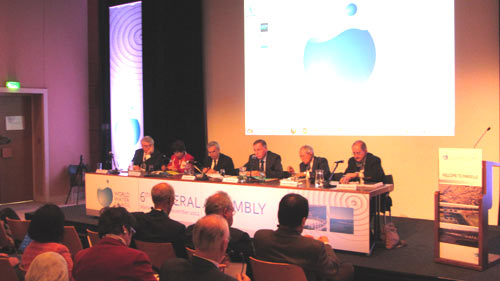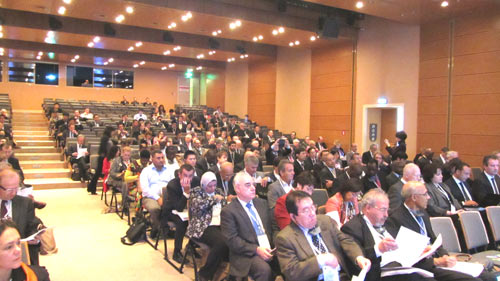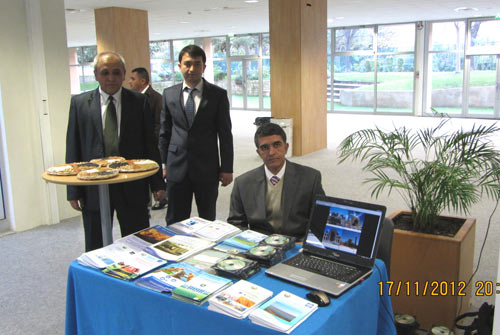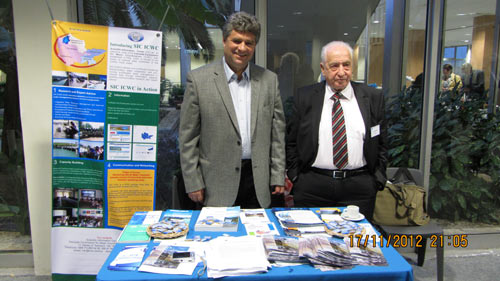PARTICIPATION OF SIC ICWC DELEGATION IN 6TH GENERAL ASSEMBLY OF THE WORLD WATER COUNCIL
On 18-19 November 2012, the 6th General Assembly of the World Water Council was held in Marseille, France. The agenda for the first day included the consideration of the report on the Council’s activity in 2010-2012, discussion of the results of the 6th World Water Forum, and lessons learnt for the organization of the 7th World Water Forum in Korea. The participants of the General Assembly approved the amendments to the regulatory documents of the Council and the financial accounts for 2009-2011.


A special session was devoted to the Water Security Pact the draft version of which was proposed by the World Water Council and included 6 principal commitments as follows: (1) call all countries to include a water right article in their constitutions; (2) recognize the water supply and sanitation issues as priority ones in the budget; (3) adopt and strengthen national and local measures for water demand management in order to decrease water consumption; (4) support the establishment of a water & energy unit as well as establishment of a global water & energy fund which deal with two key issues “Water for Food” for the development of local farming and “Water for Health” for reducing the rate of the sicknesses caused by poor water quality; (5) provision with water supply and sewerage systems when modernizing and building schools is a must; (6) ensure that the sustainable development goals should be identified in terms of water and sanitation for the period after 2015. Reports on water security issues were delivered by Mr. D. Kloss (United Nations Humans Settlement Programme UN-Habitat), Ę. Abryu (Brazilian Confederation of Agriculture and Livestock), and Mr. Al-Attiya (Qatar National Food Security Programme). Chairman of the Qatar National Food Security Programme signed a Memorandum of Understanding with the President of the World Water Council for carrying out researches and addressing water and food security issues all over the world. Orientation to ensuring of water security in Qatar itself is quite ambitious too and includes the measures for reducing groundwater use through the development of the sea water desalination system, application of drip irrigation, improvement of knowledge and raising responsibility (right up to the introduction of farming licensing) for efficient water use.
On 18 November 2012, also the members of new Board and Bureau were elected, which were to fulfill their duties for the next three years. Twenty new Board members represent 13 countries and 6 international organizations. At the initiative of Loic Fauchon, as well youth representatives will take part in Board meetings as observers. Three delegates from the youth movement will represent the ICID Working Group of the Young Water Professionals Forum, Youth Parliament for water of the Asian-Pacific region within the framework of the Korean water Forum, and Palestinian Hydrological Group. Among the Bureau members elected are Martin Vassal (Deputy Mayor of Marseille), Zhiguang Liu (Ministry of Water Resources of China), Dogan Alt?nbilek (Turkish Contractors Association), Andras Szollosi-Nagy (UNESCO-IHE Institute for Water Education), and Karin Krchnak (World Wildlife Fund WWF-USA). Ben Braga (Polytechnic School of the University of Sao Paolo, Brasilia) was elected the President of the World Water Council for three years.
The second day of the General Assembly (19 November 2012) opened with the discussion of the most burning water issues that claim attention from the Council within its strategy for 2013-2015. Key reports were presented by the Mayor of Marseille Jean-Claude Gaudin, Junior Minister for Disabled People Marie-Arlette Carlotti, President of the Marseille Provence Metropole Eugene Caselli, and Deputy Secretary-General of the Organization for Economic Cooperation and Development (OECD) Rintaro Tamaki. The necessity to move from the decisions taken at the 6th Forum to the adoption of concrete commitments for their implementation was heard in all participants’ reports. In its turn, the purpose of the Council is to pursue several strategic lines for providing water security to satisfy basic needs of the population as well as to ensuring economic development and ecological stability. In this context, they emphasized the essential role of the Green Growth Strategy promoted by the World Water Council with active participation of Korea.
They continued the discussions of the main lines of the World Water Council’s activity at the roundtable meetings devoted to the issues related to water diplomacy, communication and membership, thematic initiatives, and organization of the Forum.
Four main areas were considered at the roundtable on the themes of the WWC’s new strategy:
- Water and sanitary;
- Water and green growth;
- Water and energy;
- Water security.
Following the results of the discussions, the Council was recommended to support these key thematic areas for their practical realization, since they meet current global challenges. In the course of searching for a consensus between water and energy, WWC was suggested to establish cooperation with the World Energy Council. The latter should take into account possible negative effects of the hydropower industry development on the sustainability of water resources. Deputy Director of Scientific Information Center of the Interstate Commission for Water Coordination (SIC ICWC) of Central Asia Mr. V.I. Sokolov put forward a proposal to include the following into the Strategy within the four above-stated areas: special attention shall be paid to the promotion of mechanisms for legal regulation of water related problematic issues proceeding from the International Water Law.
At the roundtable on communications, they highlighted the necessity of wider involvement of Council members in this work refraining from factionalism and authoritarianism in management only within the WWC Bureau. It was suggested that every Council member, both current and new, should identify the extent of his/her involvement in vigorous activity: participation in thematic groups; distribution of information; donor support; etc.
The delegation of the Ministry of Agriculture and Water Resources of the Republic of Uzbekistan presented the materials that demonstrated the achievements made by the Republic in water resources management. SIC ICWC introduced its works carried out aiming at the promotion of regional cooperation in the Aral Sea basin and pursuing WWC objectives in the post-Soviet territory.


|